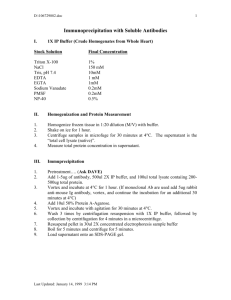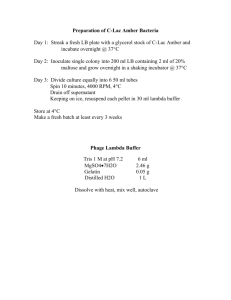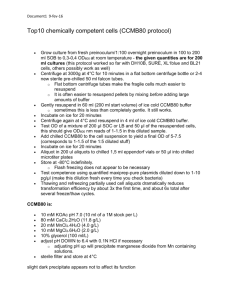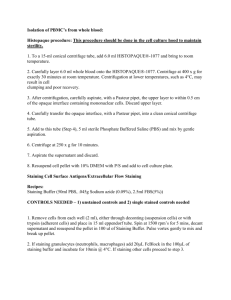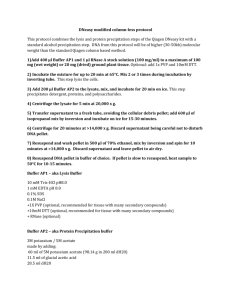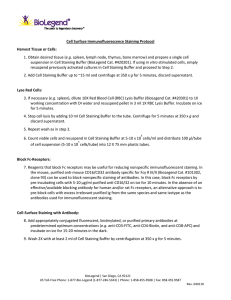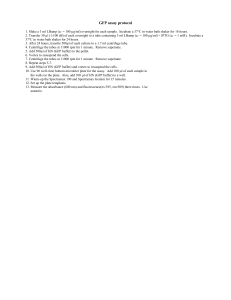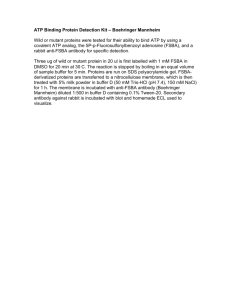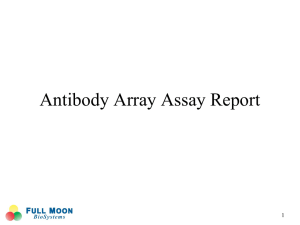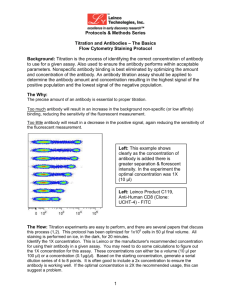General Immunofluorescence Indirect Staining Protocol
advertisement
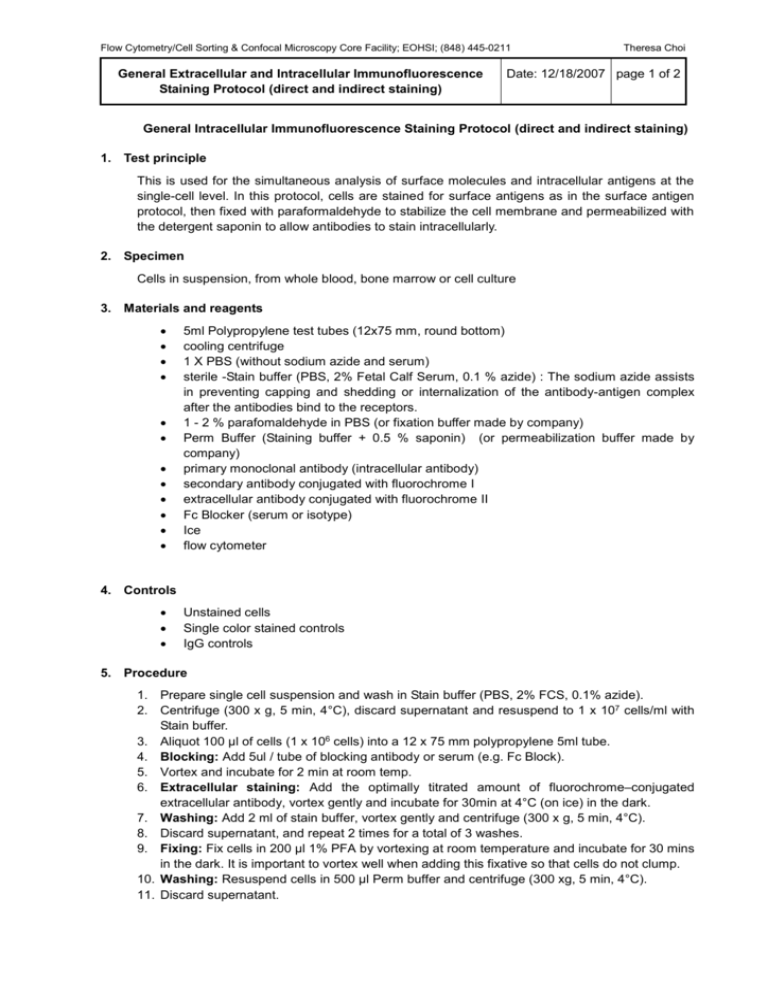
Flow Cytometry/Cell Sorting & Confocal Microscopy Core Facility; EOHSI; (848) 445-0211 General Extracellular and Intracellular Immunofluorescence Staining Protocol (direct and indirect staining) Theresa Choi Date: 12/18/2007 page 1 of 2 General Intracellular Immunofluorescence Staining Protocol (direct and indirect staining) 1. Test principle This is used for the simultaneous analysis of surface molecules and intracellular antigens at the single-cell level. In this protocol, cells are stained for surface antigens as in the surface antigen protocol, then fixed with paraformaldehyde to stabilize the cell membrane and permeabilized with the detergent saponin to allow antibodies to stain intracellularly. 2. Specimen Cells in suspension, from whole blood, bone marrow or cell culture 3. Materials and reagents 5ml Polypropylene test tubes (12x75 mm, round bottom) cooling centrifuge 1 X PBS (without sodium azide and serum) sterile -Stain buffer (PBS, 2% Fetal Calf Serum, 0.1 % azide) : The sodium azide assists in preventing capping and shedding or internalization of the antibody-antigen complex after the antibodies bind to the receptors. 1 - 2 % parafomaldehyde in PBS (or fixation buffer made by company) Perm Buffer (Staining buffer + 0.5 % saponin) (or permeabilization buffer made by company) primary monoclonal antibody (intracellular antibody) secondary antibody conjugated with fluorochrome I extracellular antibody conjugated with fluorochrome II Fc Blocker (serum or isotype) Ice flow cytometer 4. Controls Unstained cells Single color stained controls IgG controls 5. Procedure 1. Prepare single cell suspension and wash in Stain buffer (PBS, 2% FCS, 0.1% azide). 2. Centrifuge (300 x g, 5 min, 4°C), discard supernatant and resuspend to 1 x 107 cells/ml with Stain buffer. 3. Aliquot 100 μl of cells (1 x 106 cells) into a 12 x 75 mm polypropylene 5ml tube. 4. Blocking: Add 5ul / tube of blocking antibody or serum (e.g. Fc Block). 5. Vortex and incubate for 2 min at room temp. 6. Extracellular staining: Add the optimally titrated amount of fluorochrome–conjugated extracellular antibody, vortex gently and incubate for 30min at 4°C (on ice) in the dark. 7. Washing: Add 2 ml of stain buffer, vortex gently and centrifuge (300 x g, 5 min, 4°C). 8. Discard supernatant, and repeat 2 times for a total of 3 washes. 9. Fixing: Fix cells in 200 μl 1% PFA by vortexing at room temperature and incubate for 30 mins in the dark. It is important to vortex well when adding this fixative so that cells do not clump. 10. Washing: Resuspend cells in 500 μl Perm buffer and centrifuge (300 xg, 5 min, 4°C). 11. Discard supernatant. Flow Cytometry/Cell Sorting & Confocal Microscopy Core Facility; EOHSI; (848) 445-0211 General Extracellular and Intracellular Immunofluorescence Staining Protocol (direct and indirect staining) Theresa Choi Date: 12/18/2007 page 2 of 2 12. Intracellular 1° staining: Resuspend cells in 100 μl Perm buffer and add the optimally titrated amount of primary antibody and 5 μl serum ( blocking - optional). 13. Incubate for 30 min on ice in the dark. If your antibody is already conjugated with fluorochrome, you can go to step 17. 14. Washing: Resuspend in 500 μl Perm buffer, centrifuge and discard supernatant. 15. Intracellular 2° staining: Resuspend cells in 100 μl Perm buffer and add fluorochromeconjugated secondary antibody. 16. Incubate for 30 min. on ice in the dark. 17. Washing 2x : Resuspend in 500 μl Stain buffer, centrifuge and discard supernatant. Repeat. 18. Resuspend cells in 500 μl Stain buffer or 1X PBS and analyze by flow cytometer. Note: fluorochrome I and II should have different emission wavelength. You might need to adjust cell numbers, amount of antibody for your experiment. Use buffers without Phenol Red The blocking antibody step is optional but should be included if cells express high levels of Fc receptors which will contribute to non-specific binding and background fluorescence. If you purchased Fix and Perm buffer from company, you can follow the procedure (amount of buffer and incubation time) provided by the company.
